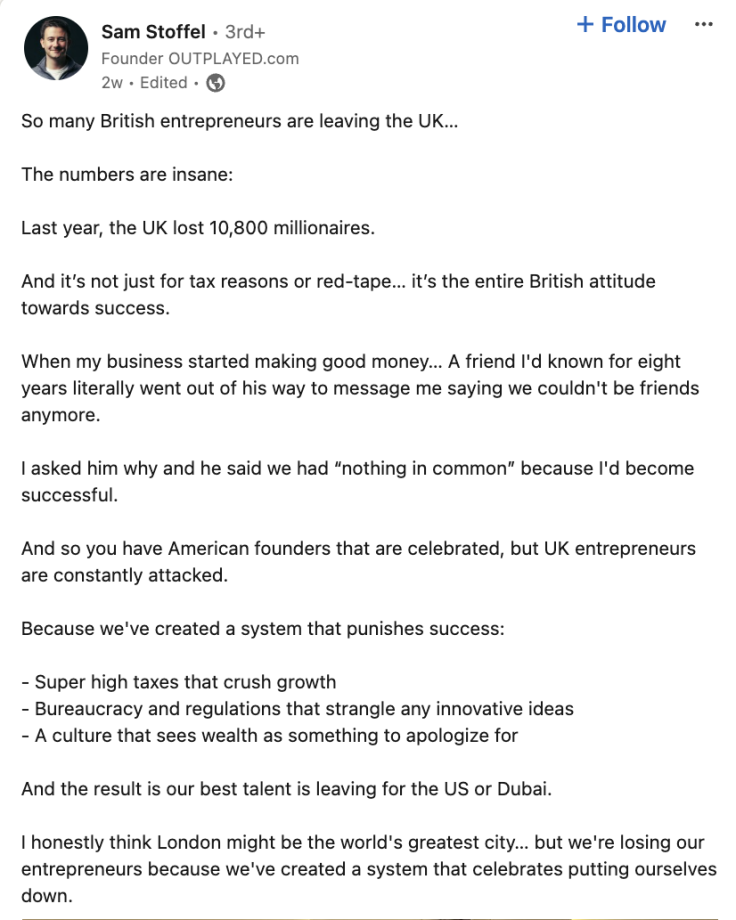CEO Reveals How British Culture is Driving 10,800 Millionaires Away—and Why America Embraces Them
The UK's value of tradition and caution could be plaguing the youth with self-doubt can stifling ambition.

A leading CEO has blamed British culture for driving away 10,800 millionaires, claiming that the nation stifles entrepreneurial ambition and fosters resentment towards success. Sam Stoffel, the CEO of Outplayed.com, argues that while high taxation and bureaucratic red tape play a role in the exodus of the wealthy, it is the UK's deep-seated attitude towards success that is pushing entrepreneurs to relocate.
Why Millionaires Are Leaving the UK
Sam Stoffel is the CEO of Outplayed.com, a matched betting service that helps people generate risk-free profits. Despite his success, Stoffel acknowledges the personal and financial setbacks he has endured, with losses amounting to thousands of pounds. However, he believes the biggest challenge facing UK entrepreneurs is not financial—it is societal.
In a recent LinkedIn post, Stoffel shared a revealing experience: a friend of eight years abruptly ended their friendship because his earnings had increased significantly, claiming they now had 'nothing in common.' This, he believes, reflects a broader issue—Britain's culture of resenting wealth rather than celebrating it.
According to Stoffel, entrepreneurs are choosing countries like the United States and Dubai because they are valued and encouraged there, whereas in the UK, success is met with hostility. The combination of envy and risk aversion, he argues, is draining the country of its most ambitious minds.

Freelancer Finds Three Key Differences Between Americans and Brits
This sentiment is echoed by ghostwriter and Business Insider correspondent Tom Scourfield, who recently explored the cultural differences between the UK and the U.S. in relation to entrepreneurship.
Scourfield recalled a £4,000 ($5,000) trip to Arizona for a business event, where he was met with enthusiasm, encouragement, and a genuine interest in his goals. However, upon returning to London, he found the atmosphere starkly different. Conversations about business were met with polite smiles and abrupt changes of subject.
He identified three critical differences in how the two nations perceive success and ambition.
1. Mindset and Ambition
In America, ambition is openly encouraged. Scourfield recalled a moment in Arizona when someone expressed their goal of building a £7.9 million ($10 million) net worth. Instead of scepticism, they were met with curiosity and enthusiasm about their plan.
By contrast, the UK tends to stifle ambition. Big goals are often dismissed as unrealistic before they are even attempted, discouraging individuals from striving for more. This, Scourfield argues, suppresses entrepreneurial potential before it has a chance to develop.
2. Varying Perceptions of Entrepreneurship
Entrepreneurship is widely accepted in the U.S. as a legitimate career path, even for those without a university degree. Young people are encouraged to explore business opportunities, and success stories are widely shared.
In the UK, however, the traditional route of higher education and 'stable' jobs is seen as the only reliable path. Scourfield recalled suggesting entrepreneurship as an option after finishing school, only for his British family to treat it as a 'phase' before insisting he obtain a degree.
His early attempts at business were also met with mockery. At 19, when he started a personal training business, his classmates ridiculed him. While he persevered, he believes this attitude discourages many young people from pursuing entrepreneurial careers.
3. Attitudes Towards Failure
Failure is an inevitable part of entrepreneurship, yet how it is perceived makes all the difference. At Scourfield's event in Arizona, business owners openly shared their past failures as badges of honour, each setback viewed as a valuable lesson. This openness fosters a culture of resilience, where taking risks is encouraged.
In contrast, failure in the UK is seen as humiliating. Scourfield believes this fear of embarrassment prevents many aspiring entrepreneurs from taking risks, ultimately stifling innovation. A society that discourages risk-taking, he argues, is a society that limits its own potential for growth.
The Problem With Tall-Poppy Syndrome
Scourfield also highlighted a key cultural difference: the prevalence of tall-poppy syndrome in the UK. Tall-poppy syndrome refers to the tendency to resent or undermine those who achieve success, cutting them down rather than celebrating their accomplishments. This behaviour, he argues, is more deeply ingrained in British culture than in America.
A similar concept, 'crabs in a bucket,' describes how individuals in a group actively pull each other down rather than helping one another succeed. If one crab tries to escape, the others will drag it back down, ensuring that no one gets ahead. This mentality prevents collective progress and fosters a culture of envy rather than support.
The UK Must Rethink Its Attitude Towards Success
If Britain hopes to retain its top talent and foster a thriving entrepreneurial ecosystem, it must reassess its cultural attitude towards ambition, success, and failure. Rather than resenting those who achieve, the UK must learn to celebrate their accomplishments. Rather than ridiculing failure, it must embrace it as part of the journey.
Until then, entrepreneurs will continue to seek out environments where their ambitions are met with encouragement rather than resistance. And as long as that remains the case, Britain will continue to lose its wealthiest and most innovative minds to nations that welcome them with open arms.
© Copyright IBTimes 2025. All rights reserved.





















